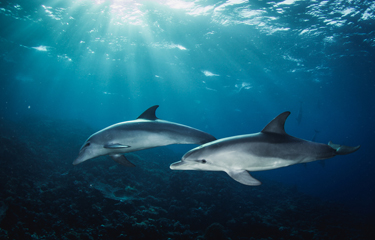In the midst of dealing with numerous price-fixing lawsuits, Bumble Bee Foods, Chicken of the Sea, and StarKist now face class-action complaints over the “Dolphin-Safe” claims on their tuna products.
While Lion Capital-owned Bumble Bee, Thai Union-owned Chicken of the Sea, and Downgon Industries-owned Starkist claim that their products are “Dolphin-Safe,” that is not the case, according to the racketeering and fraud complaints filed in United States District Court in San Francisco, California, U.S.A.
The “Dolphin-Safe” label signifies that no dolphins were killed or seriously injured as a result of the catching of the tuna contained in their products. But the suppliers’ tuna fishing practices “kill or harm substantial numbers of dolphins each year,” the lawsuit against StarKist stated.
“And, because defendant does not adequately trace or otherwise identify the tuna that is not ‘Dolphin-Safe’ and physically segregate and store it separately from any tuna that may be ‘Dolphin-Safe,’ defendant may not label any of its products as ‘Dolphin-Safe,’” the StarKist complaint said.
While StarKist “does not comment on pending legal matters”, Michelle Faist, senior manager of corporate affairs for StarKist Co., told SeafoodSource, the supplier “will not purchase any tuna caught in association with dolphins.”
“StarKist Co. is committed to protecting the dolphins and was the first company to adopt a dolphin-safe policy in April 1990,” Faist said.
The policy states that: “StarKist will not purchase any tuna caught in association with dolphins. StarKist continues its practice of refusing to purchase tuna caught with gill or drift nets, which are known to be dangerous to many forms of marine life. StarKist condemns the use of these indiscriminate fishing methods that trap dolphins, whales, and other marine life along with the intended catch of fish.”
StarKist “remains committed to this policy and require certification that all tuna we purchase is dolphin-safe,” Faist said. “Our dolphin-safe policy includes StarKist tuna, as well as all of our branded and private label products. StarKist tuna is labeled with a special ‘Dolphin-Safe’ logo.”
The complaints against Bumble Bee and Chicken of the Sea are similarly-worded.
"By expressing a commitment to sustainability, labeling its tuna products as dolphin-safe, labeling its tuna pouches as [Marine Stewardship Council]-certified, not tracking and reporting the number of dolphins killed and harmed in capturing its tuna, and not separating tuna that is not dolphin-safe from tuna caught where no dolphins were harmed (if any), [Chicken of the Sea] is able to sell its ... tuna products in several major retail stores to which it would otherwise be denied entry," the complaint stated.
A representative for Bumble Bee Foods did not respond to SeafoodSource’s request for comment. A statement from Chicken of the Sea said the company "is committed to supporting the conservation of all marine species and ensures all our products are certified ‘Dolphin Safe.’"
"Chicken of the Sea is currently certified by the Earth Island Institute and adheres to the guidelines set forth in the Institute’s ‘Dolphin Safe’ standard," the statement said.
While several tuna suppliers – including Safe Catch, Trader Joe’s, Whole Foods Market, Ocean Naturals, and Wild Planet, use pole-and-line and trolling methods to catch tuna, StarKist and Bumble Bee (with the exception of Bumble Bee’s Wild Selections line) do not.
“Rather, the fishing vessels that supply StarKist’s tuna use indiscriminate fishing methods that kill and harm substantial numbers of dolphins,” the complaint said.
For the last four years, StarKist sourced much of its tuna from vessels operated by Imperial Shipping Logistic Co. Ltd., according to the complaint.
“Those vessels routinely used longlines – which consist of a 40- to 80-mile-long main line to which many smaller branch lines with baited hooks are attached – to catch tuna. Longlines are highly indiscriminate fishing gear as they attract large numbers of target and non- target fish, as well as dolphins, that get snagged on the hooks by their mouth or other body parts when they go after the bait and then remain on the line for extended periods of time as the lines are drawn in to the vessel and the catch is obtained,” the complaint said.
Even when dolphins are mistakenly caught by the longlines, they are often not released, according to the complaint.
“Rather, the fishermen that catch these dolphins often kill them onboard and have been photographed posing with their catch, mutilating the dolphins and removing their teeth, which can be used as currency. Because of the harm caused to non-target fish, longlines have been condemned by environmental groups like the World Wildlife Foundation as an unsustainable fishing practice,” the StarKist complaint said.
StarKist also uses vessels owned by its parent company, Dongwon Industries Co. Ltd., to catch tuna in the waters around a dozen or so Western Pacific Island nations and more recently in the Atlantic.
“These vessels employ modern purse-seine fishing techniques that also harm substantial numbers of dolphins,” the complaint said.
StarKist conspired to hide the truth about its fishing prices with other companies, including SCASA, Tri Marine, and STP, which store its products, according to the complaint.







